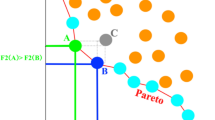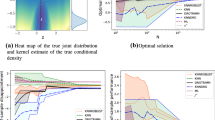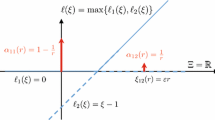Abstract
Stochastic programming has been widely used in various application scenarios and theoretical research works. However, these excellent methods depend on specific explicit probability modeling with complete knowledge of uncertainty, which is very limited in practical problem since there is usually no way to abstract complex uncertainties into the commonly used known probability models. In this paper, a novel generative model named the Adaptive Discrete Approximation Rejection Sampling is proposed for stochastic programming with incomplete knowledge of uncertainty, which can not only simulate uncertain scenarios from a complex explicit probability model that cannot meet the constraints of existing sampling methods, but also even simulate scenarios from a sample set related to uncertainty when the specific explicit probability model of uncertainty is missing or unavailable. The method is to establish the easy-to-sample proposal distribution by approximately transforming the complex hard-to-sample target probability model, to make the proposal distribution close enough to the target distribution, so as to achieve an efficient sampling while ensuring the performance of the model. On this basis, combining the Monte Carlo method and heuristic optimization, an uncertain optimization model for stochastic programming with incomplete knowledge of uncertainty is further constructed, to solve the unavailability of the existing stochastic programming methods in the absence of explicit probability model of uncertainty. Experimental results show the advantages of the proposed method in terms of applicability, adaptability, accuracy, efficiency and model performance.






Similar content being viewed by others
References
Fernández, E.; Hinojosa, Y.; Puerto, J.; Saldanha-da-Gama, F.: New algorithmic framework for conditional value at risk: Application to stochastic fixed-charge transportation. Eur. J. Oper. Res. 277, 215–226 (2019). https://doi.org/10.1016/j.ejor.2019.02.010
Liu, X.; Küçükyavuz, S.; Noyan, N.: Robust multicriteria risk-averse stochastic programming models. Ann. Oper. Res. 259, 259–294 (2017). https://doi.org/10.1007/s10479-017-2526-z
Ahmadizar, F.; Rabanimotlagh, A.; Arkat, J.: Stochastic group shop scheduling with fuzzy due dates. J. Intell. Fuzzy Syst. 33, 2075–2084 (2017). https://doi.org/10.3233/JIFS-16164
Fu, C.; Zhu, N.; Ma, S.: A stochastic program approach for path reconstruction oriented sensor location model. Transp. Res. Part B Methodol. 102, 210–237 (2017). https://doi.org/10.1016/j.trb.2017.05.013
Masmoudi, M.; Abdelaziz, F.: Ben: Portfolio selection problem: a review of deterministic and stochastic multiple objective programming models. Ann. Oper. Res. 267, 335–352 (2018). https://doi.org/10.1007/s10479-017-2466-7
Shahkoomahalli, A.; Koochaki, A.; Shayanfar, H.: Risk-based electrical-thermal scheduling of a large-scale virtual power plant using downside risk constraints for participating in energy and reserve markets. Arab. J. Sci. Eng. (2021). https://doi.org/10.1007/s13369-021-05722-4
Xie, F.; Huang, Y.: A multistage stochastic programming model for a multi-period strategic expansion of biofuel supply chain under evolving uncertainties. Transp. Res. Part E Logist. Transp. Rev. 111, 130–148 (2018). https://doi.org/10.1016/j.tre.2018.01.015
Wang, L.: A two-stage stochastic programming framework for evacuation planning in disaster responses. Comput. Ind. Eng. 145, 106458 (2020). https://doi.org/10.1016/j.cie.2020.106458
Cunha, P.S.A.; Raupp, F.M.P.; Oliveira, F.: A two-stage stochastic programming model for periodic replenishment control system under demand uncertainty. Comput. Ind. Eng. 107, 313–326 (2017). https://doi.org/10.1016/j.cie.2017.03.025
Zhan, Y.; Zheng, Q.P.; Wang, J.; Pinson, P.: Generation expansion planning with large amounts of wind power via decision-dependent stochastic programming. IEEE Trans. Power Syst. 32, 3015–3026 (2017). https://doi.org/10.1109/TPWRS.2016.2626958
Wang, K.; Jacquillat, A.: A stochastic integer programming approach to air traffic scheduling and operations. Oper. Res. 68, 1375–1402 (2020). https://doi.org/10.1287/opre.2020.1985
Li, X.; Yang, D.; Hu, M.: A scenario-based stochastic programming approach for the product configuration problem under uncertainties and carbon emission regulations. Transp. Res. Part E Logist. Transp. Rev. 115, 126–146 (2018). https://doi.org/10.1016/j.tre.2018.04.013
Fan, Y.; Schwartz, F.; Voß, S.; Woodruff, D.L.: Stochastic Programming for Flexible Global Supply Chain Planning. Springer (2017)
Amelian, S.S.; Sajadi, S.M.; Navabakhsh, M.; Esmaelian, M.: Multi-objective optimization for stochastic failure-prone job shop scheduling problem via hybrid of NSGA-II and simulation method. Expert Syst. (2019). https://doi.org/10.1111/exsy.12455
Babonneau, F.; Haurie, A.; Loulou, R.; Vielle, M.: Combining stochastic optimization and monte carlo simulation to deal with uncertainties in climate policy assessment. Environ. Model. Assess. 17, 51–76 (2012). https://doi.org/10.1007/s10666-011-9275-1
Kim, H.W.; Lee, D.H.: A sample average approximation algorithm for selective disassembly sequencing with abnormal disassembly operations and random operation times. Int. J. Adv. Manuf. Technol. 96, 1341–1354 (2018). https://doi.org/10.1007/s00170-018-1667-9
Bei, X.; Zhu, X.; Coit, D.W.: A risk-averse stochastic program for integrated system design and preventive maintenance planning. Eur. J. Oper. Res. 276, 536–548 (2019). https://doi.org/10.1016/j.ejor.2019.01.038
Masri, H.: A multiple stochastic goal programming approach for the agent portfolio selection problem. Ann. Oper. Res. 251, 179–192 (2017). https://doi.org/10.1007/s10479-015-1884-7
Masri, H.; Abdulla, Y.: A multiple objective stochastic programming model for working capital management. Technol. Forecast. Soc. Change. 131, 141–146 (2018). https://doi.org/10.1016/j.techfore.2017.05.006
Azimian, A.; Aouni, B.: Supply chain management through the stochastic goal programming model. Ann. Oper. Res. 251, 351–365 (2017). https://doi.org/10.1007/s10479-015-2007-1
Hu, Z.; Hu, G.: A multi-stage stochastic programming for lot-sizing and scheduling under demand uncertainty. Comput. Ind. Eng. 119, 157–166 (2018). https://doi.org/10.1016/j.cie.2018.03.033
Ridley, G.; Forget, B.: A simple method for rejection sampling efficiency improvement on SIMT architectures. Stat. Comput. 31, 1–11 (2021). https://doi.org/10.1007/s11222-021-10003-z
Robert, C.P.; Casella, G.: Monte Carlo Statistical Methods, Vol. 2. Springer, New York (2004)
Rao, V.; Lin, L.; Dunson, D.B.: Data augmentation for models based on rejection sampling. Biometrika 103, 319–335 (2016). https://doi.org/10.1093/biomet/asw005
Gilks, W.R.; Wild, P.: Adaptive rejection sampling for gibbs sampling. Appl. Stat. 41, 337–348 (1992)
Martino, L.; Louzada, F.: Adaptive rejection sampling with fixed number of nodes. Commun. Stat. Simul. Comput. 48, 655–665 (2019). https://doi.org/10.1080/03610918.2017.1395039
Ekblom, J.; Blomvall, J.: Importance sampling in stochastic optimization: An application to intertemporal portfolio choice. Eur. J. Oper. Res. 285, 106–119 (2020). https://doi.org/10.1016/j.ejor.2019.01.013
Botts, C.: A modified adaptive accept-reject algorithm for univariate densities with bounded support. J. Stat. Comput. Simul. 81, 1039–1053 (2011)
Nemeth, C.; Fearnhead, P.: Stochastic gradient Markov Chain Monte Carlo. J. Am. Stat. Assoc. 116, 433–450 (2021). https://doi.org/10.1080/01621459.2020.1847120
Hu, Z.; Fu, C.; Zhou, L.; Guo, Z.: Distributed Kalman filter based on Metropolis-Hastings sampling strategy. Mach. Vis. Appl. 29, 1033–1040 (2018). https://doi.org/10.1007/s00138-018-0938-7
Marcotte, D.; Allard, D.: Gibbs sampling on large lattice with GMRF. Comput. Geosci. 111, 190–199 (2018). https://doi.org/10.1016/j.cageo.2017.11.012
Zhao, R.; Li, Y.; Sun, Y.: Statistical convergence of the EM algorithm on Gaussian mixture models. Electron. J. Stat. 14, 632–660 (2020). https://doi.org/10.1214/19-ejs1660
Peng, W.: Model selection for Gaussian mixture model based on desirability level criterion. Optik (Stuttg). 130, 797–805 (2017). https://doi.org/10.1016/j.ijleo.2016.10.125
Sethuraman, R.R.; Athisayam, J.S.K.: An improved feature selection based on naive bayes with kernel density estimator for opinion mining. Arab. J. Sci. Eng. 46, 4059–4071 (2021). https://doi.org/10.1007/s13369-021-05381-5
Das, S.K.: An approach to optimize the cost of transportation problem based on triangular fuzzy programming problem. Complex Intell. Syst. (2021). https://doi.org/10.1007/s40747-021-00535-2
El Alaoui, M.: Fuzzy goal programming for biodiesel production. Int. J. Green Energy. 17, 644–651 (2020). https://doi.org/10.1080/15435075.2020.1779075
Jin, L.; Zhang, C.; Wen, X.; Sun, C.; Fei, X.: A neutrosophic set-based TLBO algorithm for the flexible job-shop scheduling problem with routing flexibility and uncertain processing times. Complex Intell. Syst. 7, 2833–2853 (2021). https://doi.org/10.1007/s40747-021-00461-3
Ye, J.: Modeling and stability analysis methods of neutrosophic transfer functions. Soft Comput. 24, 9039–9048 (2020). https://doi.org/10.1007/s00500-019-04434-0
Fan, C.; Fan, E.; Chen, J.; Ye, J.; Zhou, K.: Single-value neutrosophic cosine measure for evaluation of port logistics competitiveness. J. Intell. Fuzzy Syst. 39, 4667–4675 (2020). https://doi.org/10.3233/JIFS-200598
Du, S.; Ye, J.; Yong, R.; Zhang, F.: Some aggregation operators of neutrosophic Z-numbers and their multicriteria decision making method. Complex Intell. Syst. 7, 429–438 (2021). https://doi.org/10.1007/s40747-020-00204-w
Liu, S.; Yang, Y.; Huang, J.; Jiao, Y.; Wang, Y.: Non-asymptotic error bounds for bidirectional GANs. Adv. Neural Inf. Process. Syst. 34 (2021)
Wu, Z.; Li, G.; Liu, Q.; Xu, G.; Chen, E.; Member, S.: Covering the sensitive subjects to protect personal privacy in personalized recommendation. IEEE Trans. Serv. Comput. 11, 493–506 (2018)
Peña, J.M.; Latorre, A.; Jérusalem, A.: SoftFEM : the soft finite element method. Int. J. Numer. Methods Eng. (2019). https://doi.org/10.1002/nme.6029
Wang, R.; Wu, Z.; Lou, J.; Jiang, Y.: Attention-based dynamic user modeling and Deep Collaborative filtering recommendation. Expert Syst. Appl. 188, 116036 (2021)
Bai, B.; Li, G.; Wang, S.; Wu, Z.; Yan, W.: Time series classification based on multi-feature dictionary representation and ensemble learning. Expert Syst. Appl. 169, 114162 (2021). https://doi.org/10.1016/j.eswa.2020.114162
Yan, W.; Li, G.; Wu, Z.; Wang, S.; Yu, P.S.: Extracting diverse-shapelets for early classification on time series. World Wide Web J. 23, 3055–3081 (2020)
Li, G.; Yan, W.; Wu, Z.: Discovering shapelets with key points in time series classification. Expert Syst. Appl. 132, 76–86 (2019). https://doi.org/10.1016/j.eswa.2019.04.062
Fang, Z.; Feng, H.; Huang, S.; Zhou, D.: Theory of deep convolutional neural networks II : spherical analysis. Neural Netw. 131, 154–162 (2020). https://doi.org/10.1016/j.neunet.2020.07.029
Zhong, G.; Gao, W.; Liu, Y.; Yang, Y.; Wang, D.: Generative adversarial networks with decoder–encoder output noises. Neural Netw. 127, 19–28 (2020). https://doi.org/10.1016/j.neunet.2020.04.005
Yang, M.; Wang, X.; Lu, Y.; Lv, J.; Shen, Y.; Li, C.: Plausibility-promoting generative adversarial network for abstractive text summarization with multi-task constraint. Inf. Sci. (Ny) 521, 46–61 (2020). https://doi.org/10.1016/j.ins.2020.02.040
Ugot, C.Y.O.: A review of generative adversarial networks and its application in cybersecurity. Artif. Intell. Rev. 53, 1721–1736 (2020). https://doi.org/10.1007/s10462-019-09717-4
Zhou, X.; Jiao, Y.; Liu, J.; Huang, J.: A deep generative approach to conditional sampling. J. Am. Stat. Assoc. 1–28 (2021)
Gronauer, S.; Diepold, K.: Multi-Agent Deep Reinforcement Learning: A Survey. Artif. Intell. Rev. Springer, Netherlands (2021)
Silver, D.; Schrittwieser, J.; Simonyan, K.; Antonoglou, I.; Huang, A.; Guez, A.; Hubert, T.; Baker, L.; Lai, M.; Bolton, A.; Chen, Y.; Lillicrap, T.; Hui, F.; Sifre, L.; Van Den Driessche, G.; Graepel, T.; Hassabis, D.: Mastering the game of Go without human knowledge. Nature 550, 354–359 (2017). https://doi.org/10.1038/nature24270
Mohammadi Bidhandi, H.; Patrick, J.: Accelerated sample average approximation method for two-stage stochastic programming with binary first-stage variables. Appl. Math. Model. 41, 582–595 (2017). https://doi.org/10.1016/j.apm.2016.09.019
Bugg, C.; Aswani, A.: Logarithmic sample bounds for Sample Average Approximation with capacity- or budget-constraints. Oper. Res. Lett. 49, 231–238 (2021). https://doi.org/10.1016/j.orl.2021.01.007
Liu, H.; Wang, X.; Yao, T.; Li, R.; Ye, Y.: Sample average approximation with sparsity-inducing penalty for high-dimensional stochastic programming. Math. Program. 178, 69–108 (2019). https://doi.org/10.1007/s10107-018-1278-0
Saji, Y.; Barkatou, M.: A discrete bat algorithm based on Lévy flights for Euclidean traveling salesman problem. Expert Syst. Appl. 172, 114639 (2021). https://doi.org/10.1016/j.eswa.2021.114639
Mavrovouniotis, M.; Muller, F.M.; Yang, S.: Ant colony optimization with local search for dynamic traveling salesman problems. IEEE Trans. Cybern. 47, 1743–1756 (2017). https://doi.org/10.1109/TCYB.2016.2556742
Pandiri, V.; Singh, A.: A swarm intelligence approach for the colored traveling salesman problem. Appl. Intell. 48, 4412–4428 (2018). https://doi.org/10.1007/s10489-018-1216-0
Raykar, V.C.; Duraiswami, R.; Zhao, L.H.: Fast computation of kernel estimators. J. Comput. Graph Stat. 19, 205–220 (2010)
Marron, J.S.; Wand, M.P.: Exact mean integrated squared error. Ann. Stat. 20, 712–736 (1992)
Funding
The funding was provided by the Educational Commission of Guangdong Province, China (No.: 2020ZDZX3093).
Author information
Authors and Affiliations
Corresponding authors
Rights and permissions
About this article
Cite this article
Fang, B., Dong, Z., Zhao, C. et al. An Uncertain Optimization Method Based on Adaptive Discrete Approximation Rejection Sampling for Stochastic Programming with Incomplete Knowledge of Uncertainty. Arab J Sci Eng 48, 1399–1425 (2023). https://doi.org/10.1007/s13369-022-06835-0
Received:
Accepted:
Published:
Issue Date:
DOI: https://doi.org/10.1007/s13369-022-06835-0




